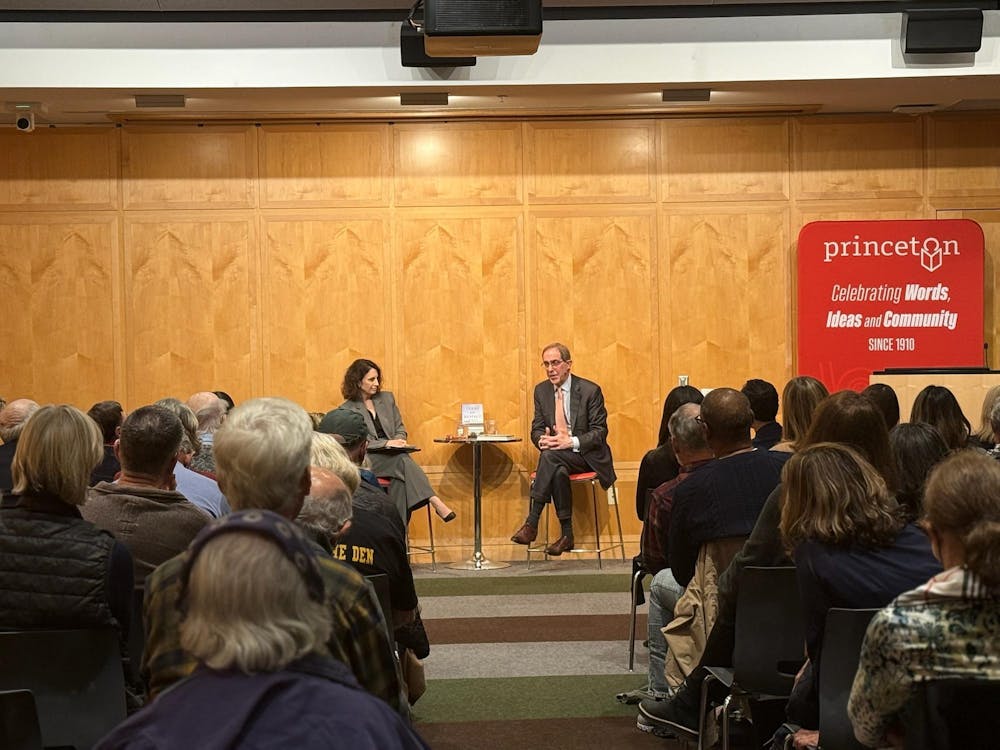University President Christopher Eisgruber ’83 addressed conflicts between free speech and censorship on college campuses during a discussion at the Princeton Public Library on Monday. He was joined in conversation by Deborah Pearlstein, Director of Princeton’s Program in Law and Public Policy.
The conversation touched on many familiar themes in his latest book, “Terms of Respect.” Eisgruber will appear at several public events on campus over the next month to promote the book, including a Nov. 18 event for Yeh and New College West first-years and a Nov. 19 appearance at the art museum.
Eisgruber opened the discussion with an excerpt from the book, arguing that threats to free speech come not from college campuses and younger generations, but from “America’s severe political polarization and the world’s changed communication platforms.”
He also addressed the difference between censorship and controversy through a reference to Judge Kyle Duncan, who was invited to speak at Stanford Law School in 2023. Duncan’s talk was interrupted by student protesters throughout and was eventually cut short.
“That’s real censorship,” Eisgruber said. “It made it impossible for a speaker that some people on campus wanted to hear to be heard, and that should be recognized.”
Eisgruber confronted a similar issue last semester when former Israeli Prime Minister Naftali Bennett’s talk at Princeton was disrupted by a walkout and a pulled fire alarm. Eisgruber released a statement afterwards denouncing “antisemitic language” used by protestors outside the talk and apologizing to Bennett. The University later barred from campus one man who had shouted down the former prime minister, although it was unable to identify the sources of antisemitic language.
“I don’t want to be trusted to be censoring speech and deciding what speech is good and what’s not. So we have this incredibly broad set of rights that, in my view, is predicated on the idea that it’s better than the alternative,” Eisgruber said.
Both during the discussion and in his book, Eisgruber cited a 2020 paper which found that 46 percent of Americans feel “less free to speak their minds than they used to.”

While he acknowledged that self-censorship is simply “a part of adult life,” he also singled out the incentives of the internet and heightened political polarization as particular causes. He highlighted another statistic from a 2024 Johns Hopkins Poll that around 50 percent of Americans think that the opposing party is “downright evil.”
“If you know that there is a significant probability that somebody may judge you to be ‘downright evil’ when you disclose your political views to them, you have an incentive to self-censor,” Eisgruber said.
Eisgruber’s book was largely completed in January, well before the Trump administration’s most aggressive salvos against the University and its peers. During the conversation, he discussed Trump’s proposed compact to nine universities, including the University of Pennsylvania, Brown University, and Dartmouth College. The compact asked these universities to agree to a set of policies regarding academic freedom, admissions, and other elements of the administration’s agenda in exchange for priority for grants and federal funding. Princeton was not directly invited to the compact, which Eisgruber condemned in a recent LinkedIn post.
“My views are exactly that the strength of American universities … depends on both academic freedom and this partnership that has existed between the government and our research universities for a period of more than 70 years now,” Eisgruber said. “Both of those two things are fundamental. We have to insist on them.”

“I didn’t think we could do this conversation in this public setting without engaging in what’s going on in the country and the administration in the world more broadly,” Pearlstein told The Daily Princetonian after the event.
Eisgruber has been particularly vocal among his peers in pushing back against the extraordinary pressures on higher education brought by the Trump administration. Still, his initial decision to stand up for higher education with his March op-ed in The Atlantic was not an easy one.
“I certainly lost a few nights of sleep before The Atlantic article came out, because I didn’t know what the reaction or the consequences would be,” Eisgruber said. “I had to think not only about the consequences for me, but the consequences for a community that’s represented in part here and that embraces a huge number of different people on the campus.”
He ultimately decided the risks of staying silent outweighed the tactical risks of speaking up. The support Eisgruber would receive afterwards helped him make other decisions going forward.
Following the release of The Daily New York Times podcast interviewing him about his commitment to higher education, Eisgruber said he had the “unique experience” of having students chase him across the courtyard to tell him they were “really proud.”
“His willingness to speak about his views carves out space for others to do that, not just on the faculty, but among the student body,” Pearlstein said to the ‘Prince.’
In a Q&A session after the conversation, Eisgruber once again reiterated his commitment to freedom of both speech and protest.
“What really would get me worried is if [students] were choosing not to engage with those subjects through the multiple classes that we offer, if they were not writing about those subjects, and I think they’re continuing to do all those things,” Eisgruber said.
Elizabeth Hu is a News contributor from Houston, Texas. She can be reached at eh9203[at]princeton.edu.
Please send any corrections to corrections[at]dailyprincetonian.com.








